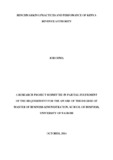Benchmarking Practices and Perfomance of Kenya Revenue Authority
| dc.contributor.author | Ouma, Job | |
| dc.date.accessioned | 2014-12-02T06:57:17Z | |
| dc.date.available | 2014-12-02T06:57:17Z | |
| dc.date.issued | 2014 | |
| dc.identifier.citation | Masters of Business Administration | en_US |
| dc.identifier.uri | http://hdl.handle.net/11295/75858 | |
| dc.description.abstract | n an ever-changing global economy, organizations must find ways for operating by developing new competences as the old advantage and competences gained is quickly eroded owing to environmental changes. Benchmarking has gained acceptance worldwide as an instrument of continuous improvement in the context of total quality management and as a means of enhancing competitiveness. It is on this premise that the researcher studied benchmarking practices adopted by KRA and their impact on performance of the Authority. The study was modeled on a case study design whereby qualitative data was collected focusing on the benchmarking practices adopted by KRA. The case study was considered appropriate for this study because the focus of the study was to answer “how” and “why” questions and the study wanted to cover contextual conditions that are relevant to the phenomenon under study. Primary data was collected using an interview guide. The interview guide was divided into two sections: section A contained questions on the background information of the respondents. Section B contained questions on benchmarking practices adopted in the four departments of the Authority. Longitudinal analysis was used considering the qualitative nature of the data collected through in-depth personal interviews and the secondary data on performance as outlined in the corporate plans of the Authority. The study found out that KRA adopts strategic and process benchmarking as expressed in the reform and modernization programme and the corporate plan objectives. The study further established that KRA not only adopts benchmarking practices in customs but such benchmarking practices have positively affected performance of KRA. Based on the findings it can be concluded that benchmarking has contributed to KRA’s success and has significantly led to improved performance both in revenue collection and service delivery. The authority has modernized its IT function and this has made functions more accessible and drastically reduced contracts with customers thereby enhancing integrity. The study recommends that the management of KRA should consider creating understanding of the current corporate plan to both top management as well as supportive staff. It is equally important that the supportive staff understand the organization’s current corporate plan because they are part and parcel of the organization. They can only support the management to work towards achieving the organization’s goals if they are made to understand the current corporate plan. | en_US |
| dc.language.iso | en | en_US |
| dc.publisher | University of Nairobi | en_US |
| dc.title | Benchmarking Practices and Perfomance of Kenya Revenue Authority | en_US |
| dc.type | Thesis | en_US |
| dc.type.material | en_US | en_US |

